
Where We Be
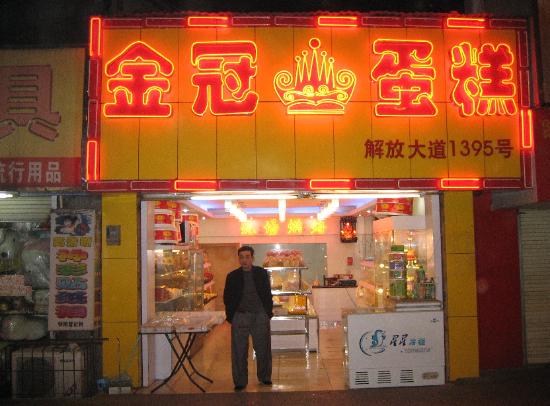
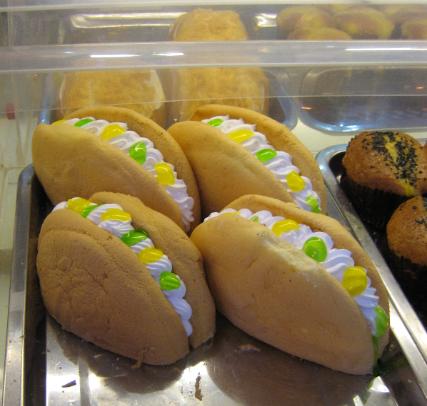
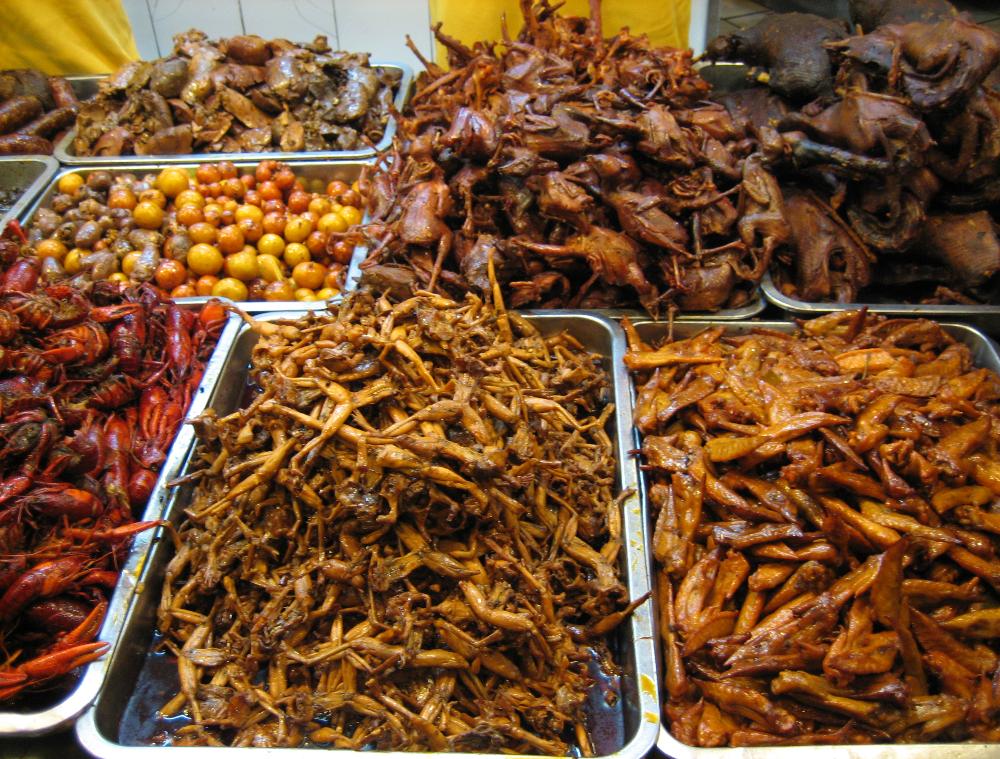
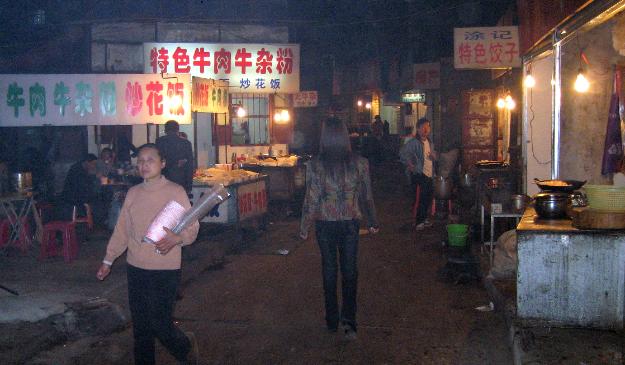
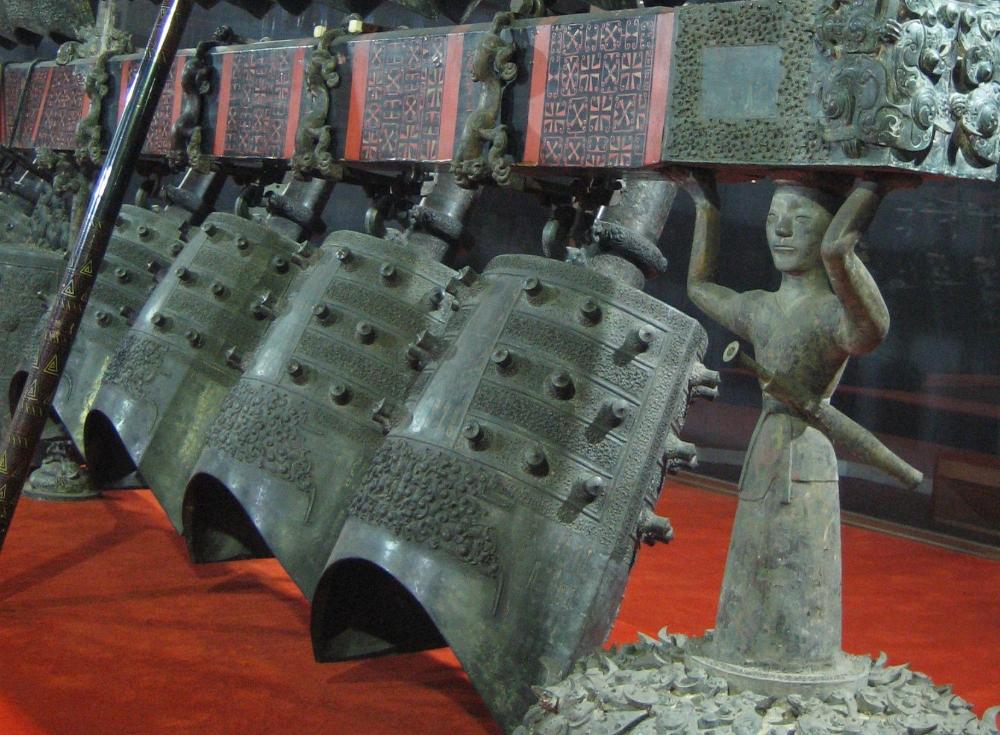
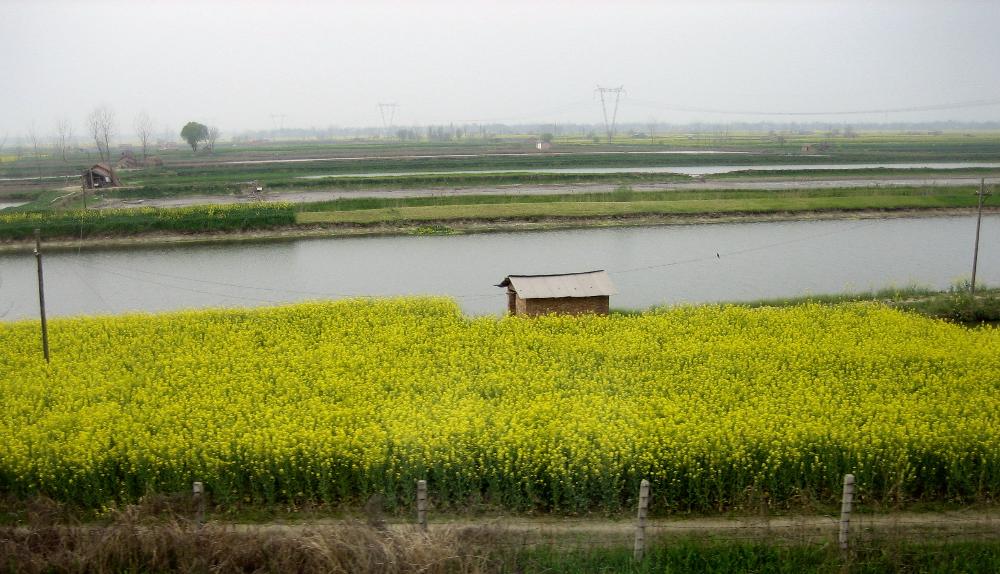
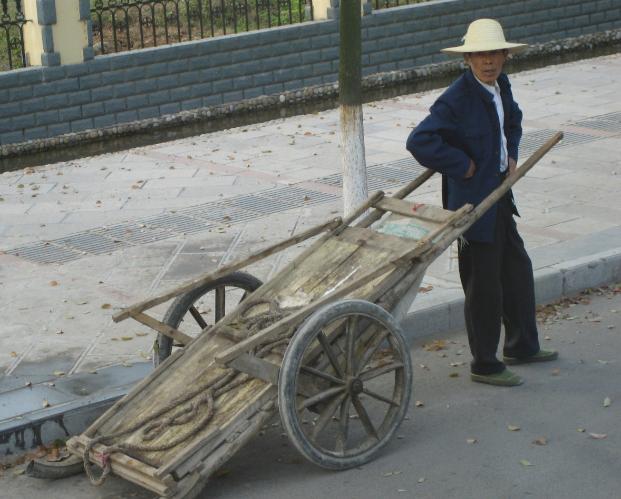
| By 8 pm this side alley was brimming over with steaming woks cooking dinners outdoors |
| Wuhan -- big, sprawling, and surprisingly fun. It's the main gateway for Yangtze river cruises. |
| Wuhan, China |
We take a domestic flight to Wuhan, the most
populous city in central China at 10 million
strong. Located along the Yangtze River, this
major transportation hub is actually divided into
three parts by the river and sprawls over both
banks. Who would have guessed this big city
would hold some of our favorite memories of
the trip? The main reason: an evening walk that
resulted in some memorable encounters.
It’s 8 pm and the outdoor food stalls are in full
swing, serving every kind of food imaginable.
We get photos of some very strange meats --
frogs on a stick, grasshoppers on a stick,
scorpions on a stick -- I’m not kidding. Anything
that can be roasted and skewered is out in the
open and on display. The most unsettling sight
is pig faces, each sold separately, which seem
to stare up at you bewildered. Roasted ducks --
necks, heads, and all -- are a common sight. But
what seems bizarre to us is totally normal to the
Chinese, and you can see them smiling in
amusement as we take pictures of what to them
is just food.
We wander down an irresistible side alley
brimming over with steaming woks and all sorts
of dumplings, noodles, and meat dishes being
cooked right out on the street. We're definitely
off the tourist path now. The alley is dark but
lots of Chinese are dining outside at tables.
The atmosphere is convivial and only slightly
intimidating to us out-of-place tourists. Clearly
we are as interesting to them as they are to us.
We watch a vocal and animated card game
being played by a group of men. One of them
speaks to me and I speak back. We both laugh
but neither of us understands a word the other
is saying.
A few paces further, as I’m lining up a picture of
a food stall on my LCD screen, I catch a young
Chinese fellow peering over my shoulder. We
have a brief conversation -- 10% Chinese, 10%
English, 80% sign language and gestures. We
part with a smile.
A fellow from our group tries to take a photo of
a pretty vendor at a fruit stand, but the shy
woman breaks into giggles, turns away, and
hides her face in her hands. Her comrades
urge her to pose but she’s too shy. Each time
she lowers her hands to see if we’re gone, our
friend is there following her with his camera,
chuckling as the hands come back up again.
We’re ambling along slowly when four young
men call out “Hello!” to us, laughing and happy.
They’re sitting in plastic chairs at an outside
table. Skewers of meat and a pitcher of strong
drink sit on the table. We call back hello just as
vociferously. More laughs. I strike up a
“conversation” in broken Chinese with one of
them which consists more of body language
than words. The next thing I know, he hands me
a skewer of what I hope is chicken.
“Jirou”? I ask. “Chicken?” He rattles off
something too fast for me to understand, then
mimics the animal I’m about to eat. As best I can
tell it's a goat; hopefully not a bad imitation of a
dog. Well, I’ve had goat before so I try it. Hmm,
not bad. Quite tasty actually -- well cooked and
spicy in a dry-hot-peppery sort of way. “Hun
hao!” I say. “Very good!”
One of them pours me a shot of liquor in a
plastic cup. I raise my plastic cup and shout
“Ganbei!” “Ganbei!” they shout back and we all
drink something that burns all the way down.
“Hun hao” I rasp. Waving and laughing, we
make our way home. But how great is it to be in
a place that isn’t jaded on tourists! Clearly we
are of as much interest to the locals as they are
to us!
populous city in central China at 10 million
strong. Located along the Yangtze River, this
major transportation hub is actually divided into
three parts by the river and sprawls over both
banks. Who would have guessed this big city
would hold some of our favorite memories of
the trip? The main reason: an evening walk that
resulted in some memorable encounters.
It’s 8 pm and the outdoor food stalls are in full
swing, serving every kind of food imaginable.
We get photos of some very strange meats --
frogs on a stick, grasshoppers on a stick,
scorpions on a stick -- I’m not kidding. Anything
that can be roasted and skewered is out in the
open and on display. The most unsettling sight
is pig faces, each sold separately, which seem
to stare up at you bewildered. Roasted ducks --
necks, heads, and all -- are a common sight. But
what seems bizarre to us is totally normal to the
Chinese, and you can see them smiling in
amusement as we take pictures of what to them
is just food.
We wander down an irresistible side alley
brimming over with steaming woks and all sorts
of dumplings, noodles, and meat dishes being
cooked right out on the street. We're definitely
off the tourist path now. The alley is dark but
lots of Chinese are dining outside at tables.
The atmosphere is convivial and only slightly
intimidating to us out-of-place tourists. Clearly
we are as interesting to them as they are to us.
We watch a vocal and animated card game
being played by a group of men. One of them
speaks to me and I speak back. We both laugh
but neither of us understands a word the other
is saying.
A few paces further, as I’m lining up a picture of
a food stall on my LCD screen, I catch a young
Chinese fellow peering over my shoulder. We
have a brief conversation -- 10% Chinese, 10%
English, 80% sign language and gestures. We
part with a smile.
A fellow from our group tries to take a photo of
a pretty vendor at a fruit stand, but the shy
woman breaks into giggles, turns away, and
hides her face in her hands. Her comrades
urge her to pose but she’s too shy. Each time
she lowers her hands to see if we’re gone, our
friend is there following her with his camera,
chuckling as the hands come back up again.
We’re ambling along slowly when four young
men call out “Hello!” to us, laughing and happy.
They’re sitting in plastic chairs at an outside
table. Skewers of meat and a pitcher of strong
drink sit on the table. We call back hello just as
vociferously. More laughs. I strike up a
“conversation” in broken Chinese with one of
them which consists more of body language
than words. The next thing I know, he hands me
a skewer of what I hope is chicken.
“Jirou”? I ask. “Chicken?” He rattles off
something too fast for me to understand, then
mimics the animal I’m about to eat. As best I can
tell it's a goat; hopefully not a bad imitation of a
dog. Well, I’ve had goat before so I try it. Hmm,
not bad. Quite tasty actually -- well cooked and
spicy in a dry-hot-peppery sort of way. “Hun
hao!” I say. “Very good!”
One of them pours me a shot of liquor in a
plastic cup. I raise my plastic cup and shout
“Ganbei!” “Ganbei!” they shout back and we all
drink something that burns all the way down.
“Hun hao” I rasp. Waving and laughing, we
make our way home. But how great is it to be in
a place that isn’t jaded on tourists! Clearly we
are of as much interest to the locals as they are
to us!
| There’s a saying: “The Chinese eat everything with four legs except the table,” and they ain’t kidding! |
| A friend from our group asks us to split an enormous pastry with him at this bakery. It looks like a giant Twinkie. We beg off at first but he seems so disappointed we end up splitting it with him. It tastes surprisingly good. From then on the three of us seek out giant Twinkie-like pastries wherever we go. |
| Wuhan Provincial Museum is one of the best small museums in China. The centerpiece is this set of 65 bronze bells from the 5th century BC, discovered intact in the tomb of a powerful warlord. Nearly everything in the museum comes from this one tomb, excavated in 1978. The largest bell weighs 450 pounds. |
| From Wuhan we get a taste of the countryside as we take a 5-hour bus ride to Yichang, the put-in point for our Yangtze River cruise |
| Whole fields of rapeseed (canola) are in bloom, resulting in amazing swathes of bright yellow that go on and on. |
| This farmer in Yichang wears a traditional straw hat and represents the other side of China -- the rural agrarian side |
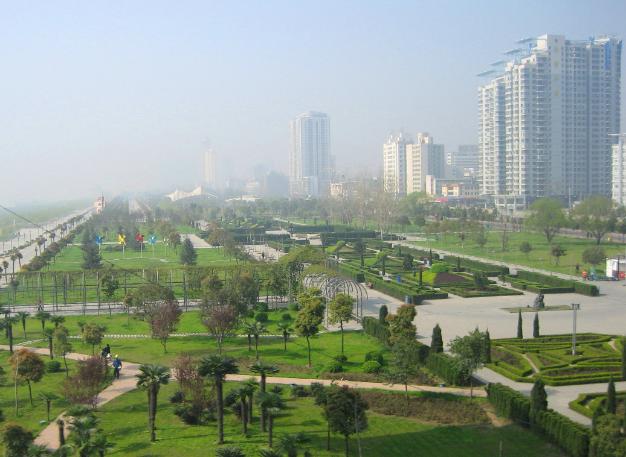
| Here you can see a collection of skewered who-knows-what-all |
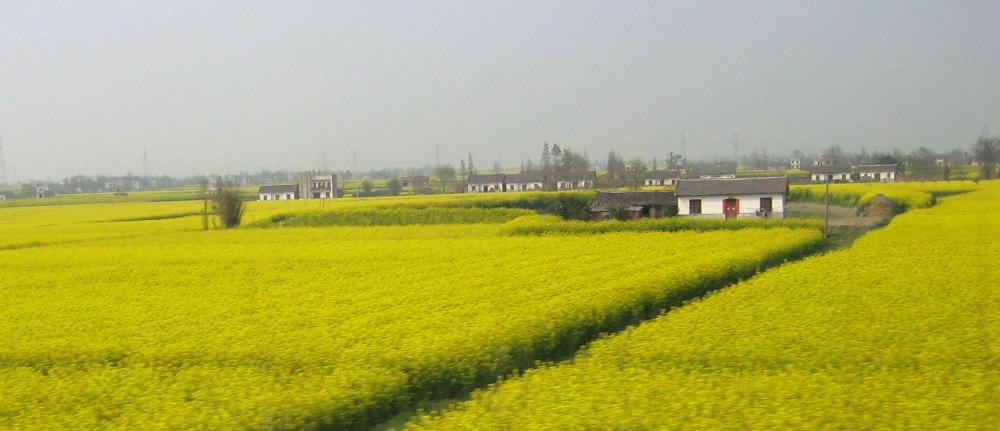
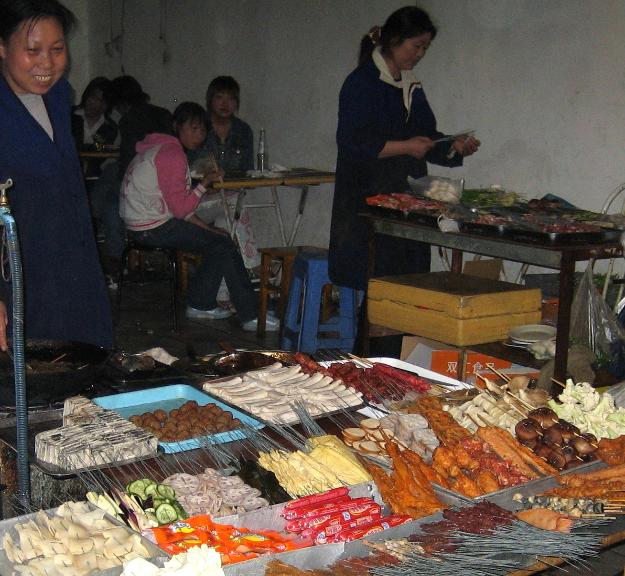
| Bus Chat #4: On Unlucky #4 and Prosperous #8 |
Our guide tells us that Chinese people are very
superstitious about numbers. They pay a lot of
attention to the numbers on their license
plates, cell phones, apartment doors, and so
on. Because the number 4 is associated with
death, most hotel elevators skip a fourth floor
and go straight from Floor 3 to Floor 5, the way
the number 13 is sometimes skipped in the U.S.
Other numbers have positive connotations: the
number 9 signifies longevity and 6 good
fortune. The number 8, symbolizing prosperity,
is particularly popular these days. Our guide
tells us that people will pay extra for two eights
in a phone number or on a license plate. He did!
China's rural population could certainly use
some of that prosperity. Our guide tells us that
millions of farmers in China still live below the
global poverty standard of $1.25 US per day. In
an attempt to even the playing field somewhat
between rich cities and poor countryside, the
government recently abolished an agricultural
tax that has stood in place for more than 2,600
years. Since only one-eighth of China’s land is
arable, officials want to incentivize people to
stay on the farms and intensively cultivate them
in order to feed the country's 1.3 billion people.
superstitious about numbers. They pay a lot of
attention to the numbers on their license
plates, cell phones, apartment doors, and so
on. Because the number 4 is associated with
death, most hotel elevators skip a fourth floor
and go straight from Floor 3 to Floor 5, the way
the number 13 is sometimes skipped in the U.S.
Other numbers have positive connotations: the
number 9 signifies longevity and 6 good
fortune. The number 8, symbolizing prosperity,
is particularly popular these days. Our guide
tells us that people will pay extra for two eights
in a phone number or on a license plate. He did!
China's rural population could certainly use
some of that prosperity. Our guide tells us that
millions of farmers in China still live below the
global poverty standard of $1.25 US per day. In
an attempt to even the playing field somewhat
between rich cities and poor countryside, the
government recently abolished an agricultural
tax that has stood in place for more than 2,600
years. Since only one-eighth of China’s land is
arable, officials want to incentivize people to
stay on the farms and intensively cultivate them
in order to feed the country's 1.3 billion people.